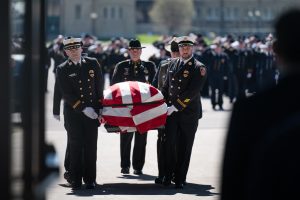Unexpected Bond
Unexpected Bond
During their quest for healing, two former soldiers crossed paths and discovered that, while serving in the U.S. Army, they both suffered traumatic brain injuries, faced similar healthcare challenges, and eventually had to confront the reality of being discharged from service.
Serving seven and 12 years respectively, Trevon B. Ferguson from Dallas and Eric Haynes from Auburn, N.Y., were eager to prove their abilities as soldiers by taking on tough assignments.
Ferguson, a native from Trinidad was an expert field artillery surveyor and deployed to Somalia, Korea, Israel, Saudi Arabia, and Germany. He also helped to locate and identify unexploded land mines during the Kosovo war in Bosnia. Shortly after joining the Army, he suffered a traumatic brain injury during a live-fire exercise. He was given wrong coordinates, which sent eight vehicles, including his humvee, over a cliff, triggering his epic battle with depression, thoughts of suicide, and most recently, epilepsy.
“In the process, eight vehicles drove off the precipice and several soldiers were hurt,” Ferguson said. “Initially, I didn’t really understand the depths of the injury. It took a while for the seizures to start, but within a few days, I started experiencing migraines, nosebleeds, and all those things that come with a brain injury.”
To date, Freedom of Information Act requests for official Army records of this accident yielded no results.
At 25 years old, Haynes, a native from New Milford, Penn., enlisted as a crane operator and served a deployment in Kuwait/Iraq during 2005-2006. Unlike Ferguson, he had already completed more than ten years of service before that fateful deployment.
In Iraq, Haynes often had to work alone in remote locations, which were sometimes in hostile territory. One scorching day in the desert, as he was about to climb into the cab of his crane perched high above the ground, Haynes missed the grip handle and fell backward onto his head, while wearing full battle gear. The impact to his head from the 15-foot drop rendered him unconscious.
“When you’re out there, you’re working by yourself, so I don’t know how long I was out for,” Haynes said.
Like Ferguson, Haynes was given medical attention when he was eventually found and taken back to his casualty unit. But the internal damage was already done.
According to the CDC, traumatic injuries to the brain occur when there is “a disruption in the normal function of the brain that can be caused by a bump, blow, or jolt to the head, or penetrating head injury.”
As a result of the trauma and follow-on complications that both soldiers suffered, their declining health led to both of them being discharged from service.
Rather than succumb to their health challenges, however, they both found the courage to face the reality of their situations. Haynes and Ferguson are involved with non-profit and veteran-related organizations and said they have found their lifelong mission to find healing for themselves and others.
Haynes volunteers at American legions in the Auburn and Syracuse area, as well as the local Veterans Affairs offices. He also co-wrote a legislative bill with a local congressman to stop military dogs from being euthanized. He and his former Special Forces bomb-sniffing dog, now service dog, Ciara, performs songs and poetry in local concerts and events to bring hope to others.
Ferguson serves on the board for the epilepsy foundation chapter in Texas and is a rising motivational speaker. He is also a brand ambassador for the Adaptive Training Foundation, Spartan Races, and Overwatch Digital Health. His role for these companies is specifically tailored to finding veterans who need the resources that these companies provide.
Editor's Note:
When working on the documentary Ferguson heard about Haynes’ story and suggested that he would like to connect since they have such similar stories. When Ferguson came to Syracuse to do his filming, the meet up was arranged. Ferguson made arrangements to get Haynes one of the epilepsy detection watches for free but needed to find out the exact type of seizure that Haynes suffers from, which he was unable to provide, and therefore the watch was not able to be programmed. Ferguson did give him copies of his book and invited Haynes to participate in the Adaptive Training Foundation 9-week course.





